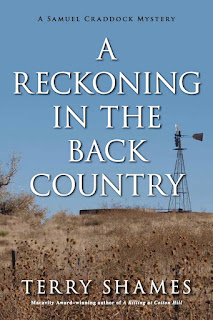Terry here, talking about our question of the week: Where do you keep your ideas? Writers need a way to store nuts for winter and retrieve them later. How do you organize yours? Could it be better?
To start, I need to talk about ideas. What are ideas? Are they are the wisps of thoughts that drift into your mind as you’re taking a walk or reading a news article, or staring at the hoping for inspiration?
Is it what we mean by inspiration? Is it those those “what if” moments when you overhear a conversation or read something that intrigues you in a book or see a situation that you never noticed before? Those moments are a dime a dozen. They’re everywhere, available to the writer who’s paying attention.
Is it what we mean by inspiration? Is it those those “what if” moments when you overhear a conversation or read something that intrigues you in a book or see a situation that you never noticed before? Those moments are a dime a dozen. They’re everywhere, available to the writer who’s paying attention.
But are those really ideas?
I think they are just suggestions of ideas--thoughts. I’ve heard of writers who keep a notebook with them all the time to record those suggestions. And I admire that, but I’ve tried it and never found it possible for me to keep it up. There are too many, and I don’t know what I would do with them.
I have a folder—yes, a manila folder, not a virtual one—where I store some of those wisps of ideas for stories. A few. I jot them down on stray pieces of paper and stick them in the folder. The problem is, I never look at the folder. Almost never. I recently went through it for no particular reason, and found some pretty nifty thoughts, but I’m not sure what to do with them. They’re scraps of ideas, not full-blown ones. And that’s the problem. Wisps of ideas are just building blocks; they aren’t stories.
What I mean by ideas are those wisps that take hold and become a story. And I don’t need to store them. The fact is that when I think about writing a story, the idea comes to me not from scraps of paper, but from a thought that has continued to nag at me over a number of days, weeks, or even years. I don’t need to store them because they don’t leave me alone.
The germ of the idea may be something someone said years ago that seemed odd. It may be a story someone told me that keeps cropping up. It may be a person whose behavior intrigued me and I’ve never forgotten it. It may be a situation that infuriated me. Whatever the germ, it nags me until I start to shape it into what I think of it as a “real” idea—not just a passing thought.
For example, a few years, I wanted to kill the doctor who damaged my shoulder permanently in a botched surgery, so I decided to do it in a book. In A Reckoning in the Back Country, I killed him.  Not him, exactly, but a doctor.
The first question was, how to kill him. It turns out that for some time the idea had been nagging me that I couldn’t write about rural Texas without at some point including the “sport” of dog fighting. You could say I “stored” the idea—but in my brain. I knew it was going to be a really difficult book to write, so I had shied away from it. But if there was any death that seemed fitting for my doctor, it was death by dog. That was when the germ of an idea started to become a story.
Not him, exactly, but a doctor.
The first question was, how to kill him. It turns out that for some time the idea had been nagging me that I couldn’t write about rural Texas without at some point including the “sport” of dog fighting. You could say I “stored” the idea—but in my brain. I knew it was going to be a really difficult book to write, so I had shied away from it. But if there was any death that seemed fitting for my doctor, it was death by dog. That was when the germ of an idea started to become a story.
 Not him, exactly, but a doctor.
The first question was, how to kill him. It turns out that for some time the idea had been nagging me that I couldn’t write about rural Texas without at some point including the “sport” of dog fighting. You could say I “stored” the idea—but in my brain. I knew it was going to be a really difficult book to write, so I had shied away from it. But if there was any death that seemed fitting for my doctor, it was death by dog. That was when the germ of an idea started to become a story.
Not him, exactly, but a doctor.
The first question was, how to kill him. It turns out that for some time the idea had been nagging me that I couldn’t write about rural Texas without at some point including the “sport” of dog fighting. You could say I “stored” the idea—but in my brain. I knew it was going to be a really difficult book to write, so I had shied away from it. But if there was any death that seemed fitting for my doctor, it was death by dog. That was when the germ of an idea started to become a story. Then I had to think of what kind of person the doctor in my book really was. He needed a past and a present. He needed a family. And then I needed a reason for him to be in Jarrett Creek. It wouldn’t do for him to be just a stranger who got killed. My settings are really important to my books, so I had to make him fit into the setting. What better way than to have a friend in town? The friend, Dooley, popped into being as a full-blown character. It wasn’t a character I needed to go to a file to find—he was just there.
As the story unfolded, characters cropped up as if they already lived in my mind.
I don’t feel like I’ve ever needed a stored cast of characters to choose from to use in a story. That would seem too contrived. Characters have to be part of the fabric of a story, they have to be as real as if they really existed.
And in a sense, they do. I’m sure they have a foundation in people I’ve known, or composites of people I’ve known. They don’t come from a stored collection of “ideas for characters.” They come with their own needs and wants; their own reasons for being in the story.
The ideas that grow into a story have a life of their own much like characters do. They percolate in the back of my mind, sometimes for years, before their nagging becomes too insistent to leave alone.
So I guess the answer to the question is that I store them in my brain. Is there a better way? If so, I haven’t found one.
And speaking of stored ideas, my idea for a book set in a motorcycle rally at the lake in Jarrett Creek has finally come to full fruition. Here is the book cover for Murder at the Jubilee Rally, which comes out on October 4.






1 comment:
So thoughtful and representative of the way writers' minds really work!
Post a Comment